|
|
|
Sort Order |
|
|
|
Items / Page
|
|
|
|
|
|
|
| Srl | Item |
| 1 |
ID:
130322
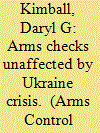

|
|
|
|
|
| Publication |
2014.
|
| Summary/Abstract |
Although the widening confrontation over the political future of the Crimean peninsula and other parts of the former Soviet Union has ruptured already-strained relations between Moscow and the West and put at risk the implementation of some nuclear risk-reduction initiatives and agreements, Russia is not planning to stop allowing the on-site inspections required under the 2010 New Strategic Arms Reduction Treaty (New START), Russian officials said last month. To protest Russia's actions to take control of Crimea, the seven non-Russian members of the Group of Eight (G-8) industrialized countries have suspended Russia's membership in the group. As part of that decision, the seven countries-Canada, Italy, France, Germany, Japan, the United Kingdom, and the United States-changed the location of their planned June summit from Sochi to Brussels. The Russian actions in Crimea have disrupted planning for the activities of the Global Partnership against the Spread of Weapons and Materials of Mass Destruction, which the G-8 launched in 2002.
|
|
|
|
|
|
|
|
|
|
|
|
|
|
|
|
| 2 |
ID:
130356
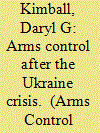

|
|
|
|
|
| Publication |
2014.
|
| Summary/Abstract |
The Global Nuclear Disarmament and risk reduction enterprise is at a crossroads as U.S.-Russian relations have reached perhaps their lowest point in more than a quarter century. Nevertheless, it remains in U.S. and Russian interests to implement existing nuclear risk reduction agreements and pursue practical, low-risk steps to lower tensions. Present circumstances demand new approaches to resolve stubborn challenges to deeper nuclear cuts and the establishment of a new framework to address Euro-Atlantic security issues.
Even before the recent political turmoil in Ukraine and Russian President Vladimir Putin's extralegal occupation and annexation of Crimea, relations between Moscow and Washington were chilly. Despite U.S. adjustments to its missile defense plans in Europe that eliminate any threat to Russian strategic missiles, Putin rebuffed U.S. President Barack Obama's proposal last June to reduce U.S. and Russian strategic stockpiles by one-third below the ceilings set by the New Strategic Arms Reduction Treaty (New START).
Moving forward will be difficult, but doing nothing is not an option. Through earlier crises during and after the Cold War, U.S. and Russian leaders pursued effective arms control and disarmament initiatives that increased mutual security and significantly reduced the nuclear danger. Much has been achieved, albeit too slowly, but there is far more to be done.
As the world's non-nuclear-weapon states persuasively argue, U.S. and Russian stockpiles still far exceed any plausible deterrence requirements, and the use of just a few nuclear weapons by any country would have catastrophic global consequences. As the 2015 Nuclear Nonproliferation Treaty (NPT) Review Conference approaches, pressure to accelerate action on disarmament will only grow.
For now, neither Russia nor the United States wants to scrap the existing arms control regime, including New START and the Intermediate-Range Nuclear Forces (INF) Treaty, which provide greater predictability and stability in an otherwise strained bilateral relationship. A return to a period of unconstrained strategic nuclear competition would not only deepen the distrust and increase dangers for both sides, but also would undermine the NPT. Scrapping the existing nuclear risk reduction measures would do nothing to protect Ukraine from further Russian aggression or reassure nervous NATO allies.
Unfortunately, the profound tensions over Ukraine delay the possibility of any formal, bilateral talks on nuclear arms reductions and missile defense. In light of these realities, Obama and other key leaders must explore alternative options to reduce global nuclear dangers and defuse U.S.-Russian strategic tensions.
|
|
|
|
|
|
|
|
|
|
|
|
|
|
|
|
| 3 |
ID:
132083
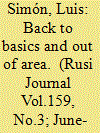

|
|
|
|
|
| Publication |
2014.
|
| Summary/Abstract |
As Allied combat forces return from Afghanistan, Russia's annexation of Crimea has reminded NATO that the security of a rules-based international system in Europe cannot be taken for granted. Efforts to reassure Allies and partners in Eastern Europe have thus become a top priority. This, however, should not lead the Allies to turn their backs on broader, global geostrategic developments - particularly at a time when Asia is emerging as the world's economic and geopolitical centre of gravity. If the West is to prosper in a changing world, argues Luis Simón, it should be able to both defend Europe and project security globally.
|
|
|
|
|
|
|
|
|
|
|
|
|
|
|
|
| 4 |
ID:
132702
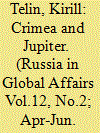

|
|
|
|
|
| Publication |
2014.
|
| Summary/Abstract |
The use of force is no longer legitimate like it was in the 19th and 20th centuries. Conservative-style action from the position of force cannot achieve anything in terms of boosting a country's position even within the traditional zone of influence.
|
|
|
|
|
|
|
|
|
|
|
|
|
|
|
|
| 5 |
ID:
132698
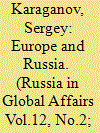

|
|
|
|
|
| Publication |
2014.
|
| Summary/Abstract |
Debates over the ongoing crisis in relations between Russia and the West revolve around the incorporation of Crimea, the global reaction to that move, and the future configuration of the Ukrainian state if, of course, it manages to survive (and I hope it will). But I contend that these are not the primary issues in global terms. There are other crucial questions. The first is what the European security system will be like. I repeat: the Old World was not allowed to withdraw from the Cold War, and now it may see a new round of tension. The second important question is whether Russia will be able to overcome the impasse in its development, in which it found itself after it restored statehood at the end of the 2000s. The third and closely linked question is whether Russia will wish to remain part - even an independent and very special partner - of Europe or will it opt for cultural-civilizational isolation and increasingly lean towards the East economically. It is obvious that Russia is firmly determined to change the rules of the game that have been dictated to it for the past twenty-five years. Unable and reluctant to toe the line, Russia has given up attempts to become part of the West.
|
|
|
|
|
|
|
|
|
|
|
|
|
|
|
|
| 6 |
ID:
132824
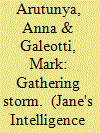

|
|
|
|
|
| Publication |
2014.
|
| Summary/Abstract |
As separatist militias mount an active insurgency in eastern Ukraine, the crisis is set to continue. Anna Arutunyan and Mark Galeotti examines Russia's role, emerging groups, and government attempts to contain the violence and regain control
|
|
|
|
|
|
|
|
|
|
|
|
|
|
|
|
| 7 |
ID:
130236
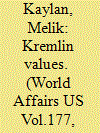

|
|
|
|
|
| Publication |
2014.
|
| Summary/Abstract |
After Forbes magazine named Vladimir Putin the most powerful man in the world, a status he has surely consolidated by overseeing the Winter Olympics and the invasion of Crimea, one heard a great deal of media talk about the Russian leader's wily skills in playing the global geostrategic "game." What one didn't hear, what one virtually never hears, even from highly experienced Western commentators on Russian affairs, is anything about Putin acting according to principles or pursuing actions according to a coherent ideology. Not surprising, you might say, since the man obviously has no such concerns-other than a will to win, for himself and his seat of power; no vision comparable to that of the Kremlin in the old Soviet Union, which furnished it and its allies with a huge asset and a troublesome headache in the form of an armory of fully rationalized ideas that legitimized a predictable approach to international relations and even provided the regime with a perverse "morality."
|
|
|
|
|
|
|
|
|
|
|
|
|
|
|
|
| 8 |
ID:
133634
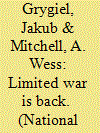

|
|
|
|
|
| Publication |
2014.
|
| Summary/Abstract |
EUROPE NEEDS to rearm and defend itself to cope with a new military threat. The American security umbrella-in both its conventional and nuclear forms-is no longer adequate, particularly on NATO's vulnerable eastern flanks. Indeed, the extended deterrent provided by the United States to its most exposed allies may not be well suited to inhibiting attacks similar to Russia's recent incursion into Ukraine, which displayed all the hallmarks of the newly popular limited conventional wars-brief and decisive, violent and yet very restrained. The purpose of such conflicts is to achieve a quick fait accompli in a geographically circumscribed area through limited force-in this case, paramilitary means followed by Russian regular forces. It is difficult to deter such a threat through the promise of retaliation, which by its very nature must occur after the facts on the ground have already been changed. A threat of retaliation is simply less credible when the enemy has achieved his objective through a low-intensity action. What are needed instead are strong local military capabilities-a preclusive defense-that increase the costs of that limited attack. Europe must start to defend its border rather than indulge in the belief that the traditional formula for deterrence, based on retaliation and the extended deterrent provided by the United States, will suffice. It won't.
|
|
|
|
|
|
|
|
|
|
|
|
|
|
|
|
| 9 |
ID:
132467
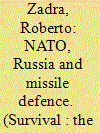

|
|
|
|
|
| Publication |
2014.
|
| Summary/Abstract |
Talks on NATO-Russia missile-defence cooperation were suspended in April during the crisis over Crimea. In retrospect, the window for a real breakthrough had closed some 18 months earlier.
After three and a half years of difficult discussions, the project exploring NATO-Russia missile-defence cooperation is not only suspended, but has probably reached its end. The initiative was an attempt to overcome Cold War thinking and realise the vision of the 2010 NATO-Russia Council Lisbon Summit: a 'true strategic and modernised partnership', and 'a common space of peace, security and stability in the Euro-Atlantic area'.
|
|
|
|
|
|
|
|
|
|
|
|
|
|
|
|
| 10 |
ID:
132782
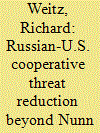

|
|
|
|
|
| Publication |
2014.
|
| Summary/Abstract |
The crisis in Ukraine probably has ruined prospects for another formal Russian-U.S. arms control agreement during the Obama administration's second term. Even before the crisis over Crimea, Russian and U.S. negotiators differed sharply on their preferred outcomes for reducing their strategic nuclear forces further, eliminating or consolidating nonstrategic nuclear weapons in Europe, constraining national and theater strategic defenses, or renewing conventional arms limitations in Europe.
|
|
|
|
|
|
|
|
|
|
|
|
|
|
|
|
| 11 |
ID:
130861
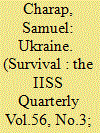

|
|
|
|
|
| Publication |
2014.
|
| Summary/Abstract |
The ugly truth is that Moscow can still undermine any Western plan for Ukraine's future. The crisis is likely to lead to a period of sustained disequilibrium and instability. As Ukraine's winter of domestic discord transformed into a spring of territorial partition and instability, European and American officials seemed to be speaking from an agreed set of talking points in their public remarks on the crisis. While hopeful transatlanticists sought to construe this remarkable consistency as a demonstration of a new seriousness of purpose in the West, the litany of warnings, threats and prescriptions for resolution (inevitably characterised as either an 'off-ramp' or 'de-escalation') spoke more to the desperation of those uttering them to quickly find a new, stable equilibrium for Ukraine, Russia and the international system. Yet the talking points and buzzwords, no matter how many times they are repeated, do not in fact describe either a sustainable equilibrium or an end point to the crisis. Instead, the disequilibrium and instability of the Ukrainian crisis seem likely to endure for some time: the search for a 'new normal' promises to be long, costly and highly disruptive of both individuals' lives and the international order.
|
|
|
|
|
|
|
|
|
|
|
|
|
|
|
|
| 12 |
ID:
130858
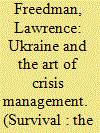

|
|
|
|
|
| Publication |
2014.
|
| Summary/Abstract |
Crisis management is the most demanding form of diplomacy. So far neither Russia nor the US and its European allies have handled it particularly well. Half a century ago, after the conflicts over Berlin and Cuba, a new term of art came into vogue: 'crisis management'. American Secretary of Defense Robert McNamara was even quoted as saying that crisis management had taken over from strategy.1 A small literature came to be devoted to the subject. In a number of respects, the term and the key themes it invoked were behind much of the debate on security policy for the remainder of the Cold War.2
The term 'crisis' comes from a Greek word indicating choice or decision, and came to refer to the turning point in a disease. The crisis was the moment when the fever reached a peak and the patient was either going to get a lot worse or a lot better. It is the moment usually marked in TV dramas by delirious patients, caring nurses, anxious relatives and lots of patting down of sweating foreheads with cold sponges. The idea of an international crisis has the same sense of stress and urgency. It means a conflict has come to a head, normally because one side has taken a bold but provocative initiative. At the moment of crisis, some big, long-standing conflict is about to be resolved, either through last-minute diplomacy or by force. The drama comes from a deadline, perhaps reinforced by an ultimatum, and intense media attention. On the news channels, the moment is usually marked by late nights in the corridors of power, emergency summits and tense United Nations Security Council meetings, while staying on the alert for military mobilisations and movements. Leaders of major powers would be expected to show that they had the temperament and character for a crisis. A steely resolve and calm judgement would be at a premium. This was the point of Hillary Clinton's famous challenge to candidate Barack Obama in 2008 as to how he would cope when 'it's 3 a.m. and your children are safe and asleep. But there's a phone in the White House and its ringing. Something's happening in the world.
|
|
|
|
|
|
|
|
|
|
|
|
|
|
|
|
|
|
|
|
|